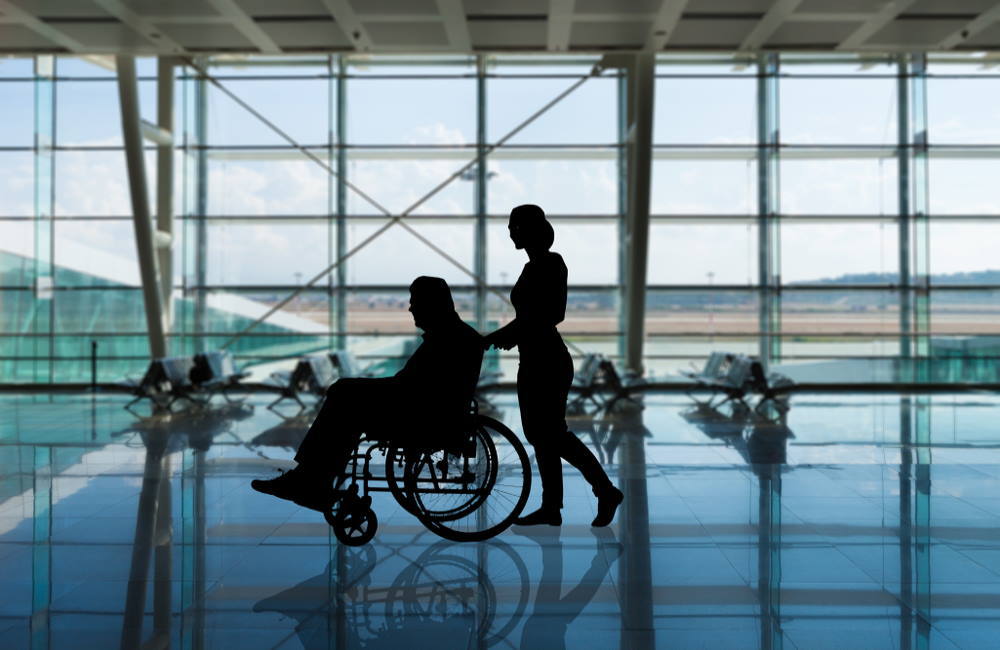
Having Amyotrophic Lateral Sclerosis (ALS) does not prevent a person from traveling. It’s possible to fly with ALS across the country or to other parts of the world as long as you follow travel tips that keep you safe and comfortable.
Hiring a flight nurse with expertise in commercial airline medical escort services can also provide benefits for those with ALS. Whether or not they choose to fly with a nurse, the key to safe travel for those with ALS is to take the time to plan ahead and anticipate any challenges before they happen.
Tips For Travel Preparation For Those With ALS
Those with disabilities, including ALS, travel more today than ever before. The ALS Association writes that “the travel industry is paying greater attention to their special needs by providing more services and accommodations.” The same is true for most airports and airlines, who focus more than ever on making travel comfortable for those who fly with ALS or need assistance.
The association also offers some tips for ALS travelers. It starts with advice that is important for anyone traveling with a disability or injury: check with your primary care physician first to ensure it’s safe for you to travel. Other recommendations before starting your journey include the following.
- Carry a letter from your healthcare provider that describes your condition, medications, potential complications, and other medical information.
- Carry a living will
- Take enough prescription medication to last the entire trip, and pack it in your carryon bag.
- Ensure you have adequate health insurance coverage, including coverage for medical evacuation. If leaving the country, ensure coverage includes travel overseas.
- Carry emergency contact information. Share your itinerary, airline tickets, credit cards, and passport details with a trusted family member or friend who is not traveling with you.
The association also recommends that those with ALS consider answers to important questions, such as whether you will need an assigned seat in a specific location, assistance you will need during boarding and deplaning, and time you need to make a connection if you plan to transfer planes.
Tips For Flying With ALS
It’s important to contact the airport and airline ahead of time for any special requests, such as preferred seating on the plane or help getting into and out of a wheelchair. If you use any type of medical equipment or device, you also must get approval by giving the airline notice at least 48 hours before your trip.
While transportation officers may not require you to take off your shoes, belt or light jacket when going through security, you still will be subject to screening and a possible pat down. Also, check your wheelchair or scooter at the boarding gate and request that it be brought to the boarding gate at your destination airport.
Have batteries to run any equipment or devices while on the plane, as only some planes have electrical outlets to plug in devices.
You also should plan ahead for how you will deal with going to the restroom if needed while on the plane. Flight attendants can use a special onboard wheelchair to move you, but they cannot provide lift assistance. The ALS Association advises that men consider using a condom catheter or adult diaper and women consider using an external female catheter or adult diapers.
Travel With a Flight Nurse
A flight nurse who works with a non-emergency medical transport company can provide assistance that makes flying with ALS that much easier. Those with ALS can work with a RN Flight Coordinator who makes all the travel arrangements in advance, building the most convenient travel itinerary possible.
They also will contact airports and airlines ahead of time, making any special arrangements required, as well as set up transportation to and from the airport.
During the journey, flight nurses travel with you, keeping track of medical equipment, medications and helping with issues such as going to the bathroom and ensuring wheelchairs and scooters are safely stored and available when you arrive at your destination.
It’s possible to fly with ALS with the right amount of planning and attention to detail. For those who feel they will require assistance, traveling with a flight nurse can make the experience safer and more comfortable.